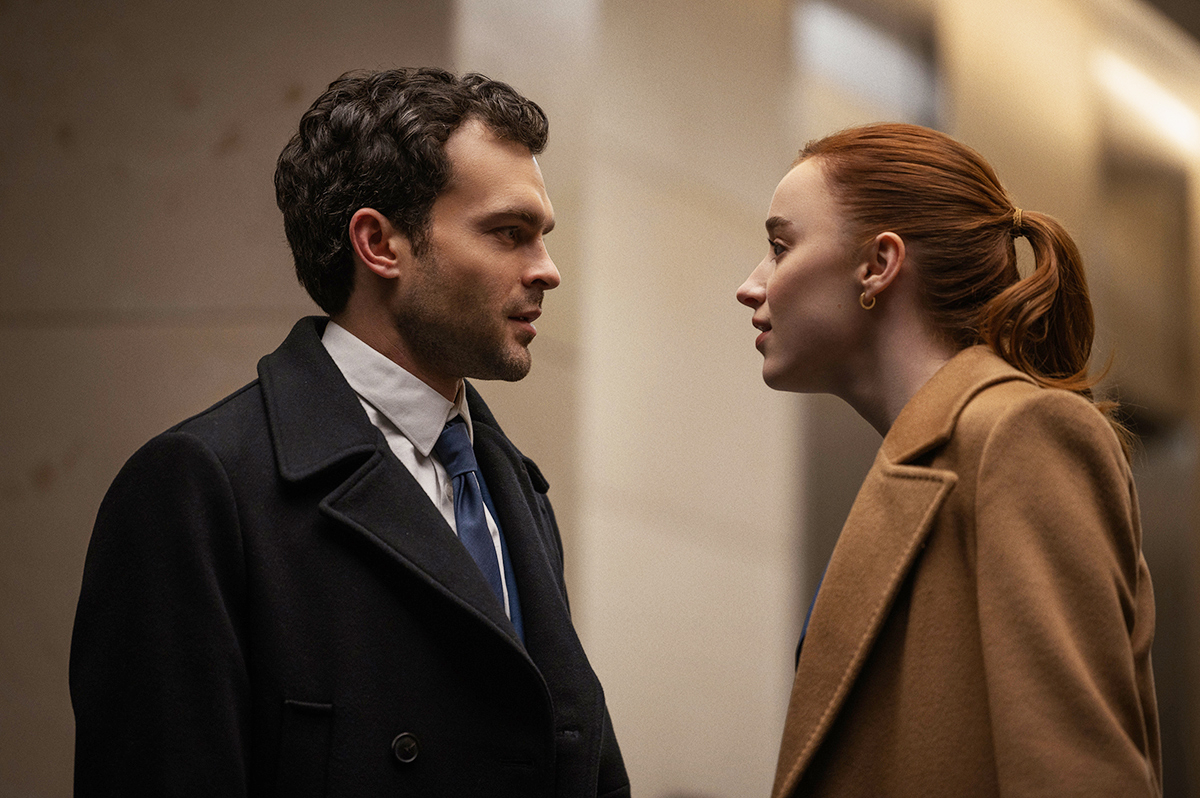‘Fair Play’ Is a Psychological Thriller That Thrives in the Grey Area
4/5 board room bros.

There’s no question over whether or not Fair Play has performances that will leave you breathless. Phoebe Dynevor and Alden Ehrenreich shine as Emily and Luke, two analysts at a private equity firm at the start of Fair Play. But when Emily is promoted to a portfolio manager and Luke becomes her analyst, the power dynamic threatens to break the balance of their secret relationship. The reason the film, written and directed by Chloe Domont, works is that the black and white ideals of storytelling don’t exist in this world, and the grey areas of the real world permeate all of Emily and Luke’s life.
Starting on the same playing field at work, Emily and Luke keep their relationship a secret. They live together and are engaged, but don’t tell HR that they are together. But when a PM is let go, a position is opened up, and the rumor is that Luke is up for the job. So when it’s offered to Emily, the dynamic of their relationship is flipped in her favor even though the beginning of her promotion has Luke promising her that he’s fine with it. It’s a story of power, the art of manipulation, and how even the best of men can be swayed by the art of suggestion.
Emily is not innocent throughout the movie, a woman who lets toxic masculinity rule her life just as much as Luke does, and the grey area in which both Emily and Luke operate lets the audience take what happens in the movie into our own interpretation. It doesn’t paint a clear picture; it doesn’t label a hero or a villain. The story that unfolds is complicated and rooted in a patriarchal world.
It’s a question of what you believe
Domont leaves the interpretation of Emily and Luke’s story up to you, which is why this is a story you want to go into fresh. The last act of Fair Play is completely up to what you think happened between Emily and Luke throughout the film. These characters are far from perfect examples of feminist ideals. Emily is (seemingly) the only woman at work, and we don’t see her interacting with anyone other than men. Luke falls into a rabbit hole of propaganda when his work life falls into disarray.
For two people who are seemingly so open in their home life at the start of the movie, their relationship fails when both Emily and Luke don’t communicate, and it fails quickly. The two are talking at the start, open and honest, but the minute the dynamic shifts and Luke gets an idea about her, the communication stops.
You can believe what you want about the last act of Fair Play; that’s Domont’s seeming design—to force a conversation about the end and the actions of Emily and Luke throughout their relationship. What makes Fair Play so fascinating is the modern ideas put into the mindset of the thrillers we used to see regularly in the ’90s, not a perfect example of the genre but an exploration of a style of movies that have been missing for quite some time.
A thriller that will keep you thinking
For some reason, Hollywood has stopped making thrillers in the way it did in the ’90s and early ’00s. Movies like What Lies Beneath and even Unfaithful would stay with you and weigh on you as you left the theaters, and you’d think about these characters and their actions in a way that you might not after an action movie or even a drama.
While not a movie I would label as an “erotic” thriller, Fair Play does have the vibe of movies like Fatal Attraction and Basic Instinct in the sense that the evolution of these characters throughout the film operates in a way that you’re not sure who you’re supposed to trust.
What makes Fair Play stand out is that there doesn’t seem to be a person to support by the end.
No one is a good guy
It’s not often that a movie doesn’t paint someone as a perfect person. No one is in the right or the wrong, and we don’t really have anyone to root for in this. It’s not about a “good” person or a bad one; it’s just about seeing how they react to the situation they find themselves in, and that’s where the story really thrives.
It’s one of those movies that you can’t stop thinking about, in a good way. Even when you think you’ve finished thinking about Fair Play, you’ll start to think of something else and begin to unpack what you think it means, and it might not be what someone else does. That’s what really works about Domont’s work. No one is going to have the same reaction to it, and this is the genre of film that we’ve missed.
Fair Play is worth the watch, will consume your thoughts, and is one you will definitely want to talk about.
(featured image: Sergej Radovic / Courtesy of Netflix)
Have a tip we should know? tips@themarysue.com